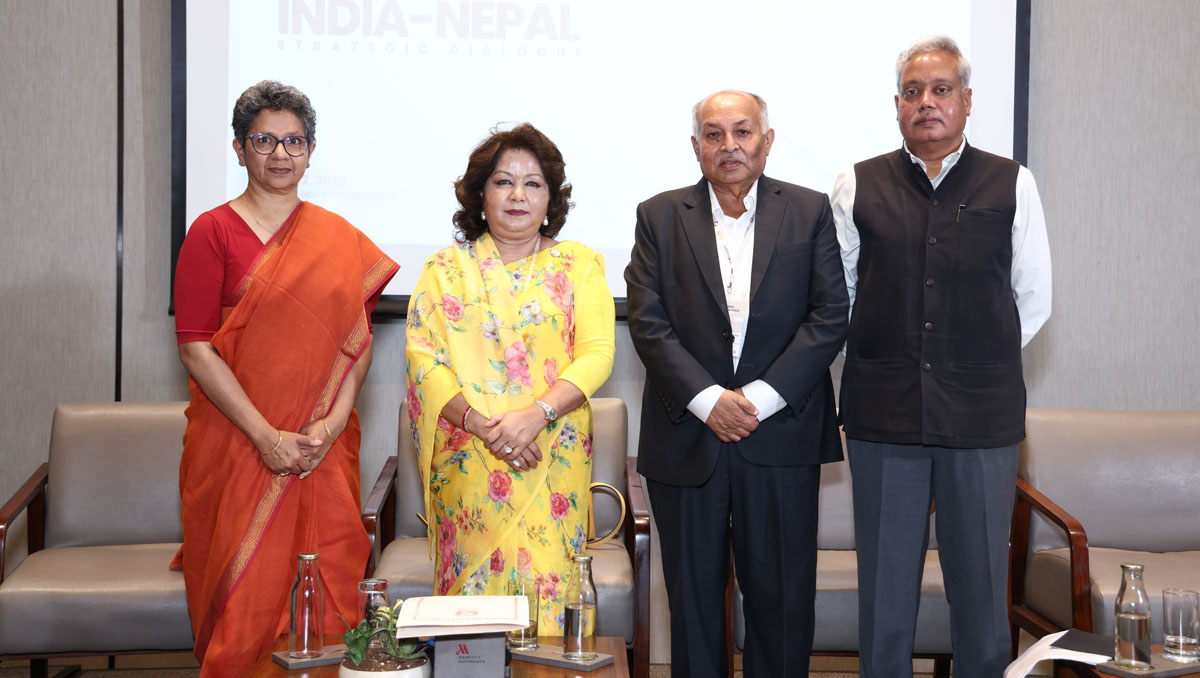
Kathmandu, June 12: The Centre for Social Innovation and Foreign Policy (CESIF), Nepal, and the Ananta Aspen Centre (AAC), New Delhi, India, co-hosted the Track 2 India-Nepal Strategic Dialogue on June 12, 2025, at the Marriott Hotel in Kathmandu. The dialogue brought together leading policymakers, diplomats, industry experts, and scholars from both countries to deliberate on critical dimensions of India-Nepal relations.
According to the press release, the program commenced with welcome remarks by Amb. Vijay Kant Karna, CESIF’s Executive Chairperson, and Ms. Indrani Bagchi, AAC’s CEO, setting the tone for the day-long discussions. In his welcome remarks, Amb. Karna emphasized the importance of deepening India-Nepal ties through structured dialogue and practical cooperation.

He emphasized that the inaugural India-Nepal Strategic Dialogue aims to serve as a platform for advancing shared prosperity by fostering partnerships among governments, businesses, and policymakers across key sectors, including energy, trade, and digital innovation. “We understand that given our geographical and social realities, our prosperity is linked to the prosperity of each other,” he noted.
Ms. Bagchi noted that this is a defining moment in regional and global history, making it all the more vital to reaffirm and future-proof neighborhood ties. She highlighted a shift in focus from past challenges to forward-looking priorities such as digital innovation, emerging technologies, and actionable cooperation that serves the next generation.

Naveen Srivastava, Ambassador of India to Nepal, reaffirmed India’s commitment to strengthening the India–Nepal partnership under the “Neighborhood First” policy, emphasizing that borders should serve as bridges of connectivity.
He highlighted growing cooperation across infrastructure, energy, trade, digital payments, and people-to-people linkages, citing Nepal’s significant electricity exports to India and the growing use of India’s UPI system in Nepal as examples of mutually beneficial progress. He underscored shared security concerns, particularly the threat of cross-border terrorism, and appreciated Nepal’s unequivocal support following the April 2025 Pahalgam attack, which claimed the life of a Nepali citizen.

Acknowledging that some bilateral issues remain, he stressed the importance of addressing them in a spirit of friendship and dialogue. He expressed confidence that forums like the India–Nepal Strategic Dialogue would play a vital role in deepening mutual understanding and shaping future cooperation.
In her inaugural speech, Dr. Arzu Rana Deuba, Minister for Foreign Affairs of Nepal, called for deeper India–Nepal cooperation amid global challenges such as climate change, geopolitical shifts, and rapid technological transformation. Emphasizing economic partnership, green energy, digital innovation, and regional integration, she stated, “Nepal and India must transform proximity into prosperity by improving connectivity, from roads and railways to digital infrastructure.”
She highlighted progress on the Pancheshwar Hydropower Project as a step toward the joint goal of exporting 10,000 MW of electricity to India, noting shared commitment to a greener, more interdependent future. Dr. Deuba also stressed that Nepal and India face common security threats, making collaboration in security and strategic sectors vital for regional stability and mutual resilience.

Following the keynote address, the Dialogue featured in-depth discussions on four key themes: strategic and security cooperation, energy and climate change, trade and connectivity, and digital innovation. Each session brought together leading Indian and Nepali experts, including former diplomats, senior bureaucrats, private sector leaders, and policy practitioners.
The first session was titled Strengthening Bilateral Ties – The Future of India–Nepal Relations. This session examined the broader strategic trajectory of India–Nepal relations. Participants emphasized the need to institutionalize dialogue mechanisms, strengthen mutual trust, and maintain regular high-level engagements alongside Track 2 diplomacy.
Discussions also touched on managing public perception, deepening political trust, and enhancing policy coordination to ensure that bilateral ties remain resilient amid shifting geopolitical dynamics. The session also revisited the open border as a foundational element of the bilateral relationship. While praised for enabling deep people-to-people ties, its evolving complexities, particularly regarding migration, security, and trafficking, call for a more modern, human-centered approach to border governance.
Finally, a recurring question throughout the session was how smaller states like Nepal can exercise genuine strategic agency while managing relationships with larger competing powers.
The second session was titled Energy Cooperation and Climate Change. The session highlighted energy as a cornerstone of bilateral cooperation, with particular focus on hydropower trade, grid connectivity, and climate resilience. Participants discussed the potential of joint ventures in renewable energy, the significance of long-term power trade agreements, data sharing, and the importance of integrating climate goals into development strategies.
Framing climate change as an urgent and existential regional security threat, this session emphasized the need for deeper cooperation in protecting shared natural resources, especially the cryosphere and transboundary water systems. While Nepal possesses enormous theoretical hydropower potential, only a fraction is currently being tapped, due to a combination of high financial risks, limited cross-border grid integration, and unclear regulatory frameworks.
The third session was titled Connectivity, Trade, and Economic Cooperation. This session showed the need for seamless connectivity to boost trade, investment, and regional economic integration. Discussions focused on infrastructure upgrades, reducing non-tariff barriers, and improving trade facilitation measures. Participants emphasized aligning border logistics, harmonizing standards, and accelerating implementation of cross-border railway and highway projects to unlock shared economic potential.
The final session was titled Digital Innovation – Cooperation on Digital Infrastructure & Emerging Technologies. The final session focused on strengthening cooperation in digital transformation, cyber governance, and emerging technologies such as artificial intelligence and fintech.
A key area of discussion was the potential for scaling up digital payment systems, with India’s Unified Payments Interface (UPI) highlighted as a successful model for cross-border financial interoperability. Participants emphasized the value of aligning digital regulations, promoting cross-border digital startups, and collaborating in cybersecurity. Strengthening digital infrastructure, ensuring data security, and expanding digital literacy were viewed as critical for enabling inclusive growth and fostering a resilient, innovation-driven regional partnership.
The event ended with closing remarks from Indrani Bagchi from AAC and Amish Raj Mulmi from CESIF Nepal.